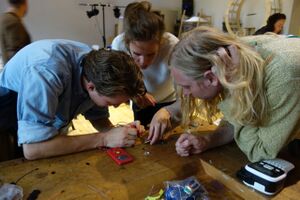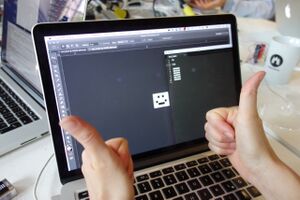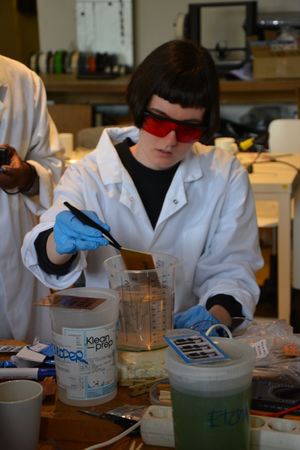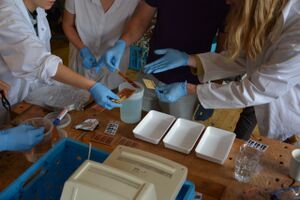HDSA 2016. If you are so smart why are you so poor: Difference between revisions
No edit summary |
No edit summary |
||
| (136 intermediate revisions by 5 users not shown) | |||
| Line 1: | Line 1: | ||
{{Event | |||
|Name=HDSA 2016. If you are so smart why are you so poor | |||
|Location=De PUNT, Waag Society | |||
|Date=2016/07/24-2016/08/05 | |||
|Time=10:00-18:00 | |||
|Type=HDSA2016 | |||
|Web=Yes | |||
|Print=No | |||
}} | |||
H&D believes designers and artists should be empowered with the tools of the digital realm including coding and hardware usage and construction. Conversely technologists should be more comfortable and effective in engaging in creative processes through familiarity with the vocabulary of designers and artists. All disciplines should become more comfortable in theoretical and social discourse, and thus be asking questions such as ''should we'' instead of ''can we''.<br><br> | |||
During the summer of 2016 Hackers & Designers invited an international group of ambitious participants to learn by creating, researching, and discussing. | |||
[[File:DSC00461.jpg|Roel and Dennis|thumb|]]<br> | |||
===At work.=== | |||
Centering around the controversial topic of immaterial labor, and the effects digital economies have on our current techno-society, H&D engages in the on-going discussion at stake in both design/art and developer practices. H&D invited the summer academy participants to go into discussion and critically reflect on their (digital) activities that exist outside/alongside the traditional wage-based definition of labor. What does it mean for the future of our practices to contribute to creative commons and open source projects, to self-initiate, to organize communities, to promote and publish on social networks, to perpetually generate content, to evolve multiple identities as blog gers, vloggers, mojo contributors…? | |||
[[File:DSC00440.jpg|Thumbs up|thumb|]]<br> | |||
===Progam=== | |||
The program was divided in two thematic blocks of each 5 days – both dealing with the condition of being ''At work''. | |||
=== | ====Block 1 Soft work: 25 – 30 July 2016==== | ||
at De PUNT, Frans de Wollantstraat 84, Amsterdam | |||
''With [http://dyne.org/ Dyne (Freecoin)], [http://www.hackyourfuture.net/#/ Hack Your Future], [http://technofle.sh/ Technoflesh (Simone Niquille)] & [https://twitter.com/carinanamih?lang=de Carina Namih], [http://constantvzw.org/site/?lang=en Nicolas Malevé (Constant Association for Art & Media)]'', [http://ilu.servus.at// Lídia Pereira] | |||
*Mode of production: hands-on! wire framing, software development & prototyping, designing, discussion | |||
The | *Workshops: [[Dowse|Dowse – The Privacy Hub for the Internet of Things]], [[Internet of Bodies|The Internet of Bodies]], [[Networked Labor|Networked Labor and Collective Intelligence. On mechanical turks and machine learning]] | ||
=== | *Talk [[Immaterial Labor Union]] | ||
*Topics: Digital economies, machine learning, computer vision & mechanical turks | |||
The first block ''Soft work'' focused on software construction along side looking at soft concepts including soft money, soft intelligence, soft power, soft or informal forms of organization of work etc. while taking place at De PUNT. | |||
====Block 2 Hard work: 1 - 5 August 2016==== | |||
at Waag Society’s Fablab, Nieuwmarkt 4 Amsterdam | |||
''The participants developed projects & prototypes, with technical support by the workers of the Fablab.'' | |||
''With [http://dennisdebel.nl/ Dennis de Bel] & [http://www.roelroscamabbing.nl/ Roel Roscam Abbing]'' | |||
*Mode of production: hands-on! | |||
*Workshop: [[Modem Workshop|Modem Workshop. A(n) (im)practical introduction to Hertzian space.]] | |||
*Hardware hacking, wiring, soldering, prototyping and discussing while making a smart machine | |||
The second block: ''Hard Work'' focuses on Hardware construction along hard concepts like hard money, hard data, hard labor, etc., while taking place at the Fablab of Waag Society. The two blocks complement each other in terms of taught technical skills and in regards to the content. | |||
=== | ====[[H&D Summer Talks 2016|H&D Summer Talks''', August 5th 2016 at Butchers Tears, Amsterdam]]==== | ||
The | The workshops will be contextualized with a public film night and lecture program – the Hackers & Designers Summer Talks. | ||
For the lecture night Hackers & Designers invited cross-disciplinary speakers to take the participants and the public into a deeper conversation around the topics investigated during the summer academy. | |||
==Approach== | |||
===DIY (Do it yourself)=== | |||
The hands-on approach and the challenges that come with making as opposed to talking will stay central throughout the whole program. H&D believes that in order to develop a deeper understanding of the qualities and disadvantages of technology we need to look inside the black boxes of the technology that we heavily rely on in our daily physical and digital, and our private and professional lives. Therefore we urge the participants of the summer academy to open the box, look inside it, rummage through it or even make their own boxes. | |||
[[File:DSC_2999.jpg|Lab Hannah|thumb|]]<br> | |||
===DIT (Do it together)=== | |||
Technologists will be engaged at the very beginning of the creative process. Similarly the designers and artists will be invited to experiment and engage with unfamiliar and deeper technological concepts with which they may not be immediately equipped. It is through Aanvraag e-culture: Hackers & Designers Summer Academy 2016 2 the collaborative approach where common vocabulary and understanding will arise, and be available in future endeavors beyond the Summer Academy. | |||
[[File:DSC_2975.jpg|Lab Together|thumb|]]<br> | |||
*'''All workshops were accessible for both the tech-savvy and newbie nerds. | |||
Find the extensive PDF version of the 2016 program here: [http://hackersanddesigners.nl/HD2016-program%2008.05.46.pdf] and the documentation of 2015 Summer Academy here: [http://wiki.hackersanddesigners.nl/mediawiki/index.php/HDSA_2015._About_bugs,_bots_%26_bytes] | |||
Funded by: | |||
[[File:Stim.jpg]]<br> | |||
In collaboration with: | |||
[[File:WS_logo_white.png|Waag Society|200px]]<br> | |||
Supported by: | |||
[[File:copy-bt_logo.png|Jajajaneeneenee|180px]]<br> | |||
[[Ja Ja Ja Nee Nee Nee]] | |||
[[File:sketch-v1-janee_03.png|Jajajaneeneenee|180px]]<br> | |||
This publication is made using Wikimedia as a co-writing and editing tool, Pandoc to translate the wiki markup to html and Scribus to layout the pages. | |||
Find more about the workflow on the [[How to document a summer academy|H&D wiki]] and the source code on the H&D [https://github.com/hackersanddesigners/handd-book github] | |||
Latest revision as of 16:57, 9 January 2020
| HDSA 2016. If you are so smart why are you so poor | |
|---|---|
| Name | HDSA 2016. If you are so smart why are you so poor |
| Location | De PUNT, Waag Society |
| Date | 2016/07/24-2016/08/05 |
| Time | 10:00-18:00 |
| PeopleOrganisations | |
| Type | HDSA2016 |
| Web | Yes |
| No | |
H&D believes designers and artists should be empowered with the tools of the digital realm including coding and hardware usage and construction. Conversely technologists should be more comfortable and effective in engaging in creative processes through familiarity with the vocabulary of designers and artists. All disciplines should become more comfortable in theoretical and social discourse, and thus be asking questions such as should we instead of can we.
During the summer of 2016 Hackers & Designers invited an international group of ambitious participants to learn by creating, researching, and discussing.
At work.
Centering around the controversial topic of immaterial labor, and the effects digital economies have on our current techno-society, H&D engages in the on-going discussion at stake in both design/art and developer practices. H&D invited the summer academy participants to go into discussion and critically reflect on their (digital) activities that exist outside/alongside the traditional wage-based definition of labor. What does it mean for the future of our practices to contribute to creative commons and open source projects, to self-initiate, to organize communities, to promote and publish on social networks, to perpetually generate content, to evolve multiple identities as blog gers, vloggers, mojo contributors…?
Progam
The program was divided in two thematic blocks of each 5 days – both dealing with the condition of being At work.
Block 1 Soft work: 25 – 30 July 2016
at De PUNT, Frans de Wollantstraat 84, Amsterdam
With Dyne (Freecoin), Hack Your Future, Technoflesh (Simone Niquille) & Carina Namih, Nicolas Malevé (Constant Association for Art & Media), Lídia Pereira
- Mode of production: hands-on! wire framing, software development & prototyping, designing, discussion
- Workshops: Dowse – The Privacy Hub for the Internet of Things, The Internet of Bodies, Networked Labor and Collective Intelligence. On mechanical turks and machine learning
- Topics: Digital economies, machine learning, computer vision & mechanical turks
The first block Soft work focused on software construction along side looking at soft concepts including soft money, soft intelligence, soft power, soft or informal forms of organization of work etc. while taking place at De PUNT.
Block 2 Hard work: 1 - 5 August 2016
at Waag Society’s Fablab, Nieuwmarkt 4 Amsterdam
The participants developed projects & prototypes, with technical support by the workers of the Fablab.
With Dennis de Bel & Roel Roscam Abbing
- Mode of production: hands-on!
- Hardware hacking, wiring, soldering, prototyping and discussing while making a smart machine
The second block: Hard Work focuses on Hardware construction along hard concepts like hard money, hard data, hard labor, etc., while taking place at the Fablab of Waag Society. The two blocks complement each other in terms of taught technical skills and in regards to the content.
H&D Summer Talks, August 5th 2016 at Butchers Tears, Amsterdam
The workshops will be contextualized with a public film night and lecture program – the Hackers & Designers Summer Talks.
For the lecture night Hackers & Designers invited cross-disciplinary speakers to take the participants and the public into a deeper conversation around the topics investigated during the summer academy.
Approach
DIY (Do it yourself)
The hands-on approach and the challenges that come with making as opposed to talking will stay central throughout the whole program. H&D believes that in order to develop a deeper understanding of the qualities and disadvantages of technology we need to look inside the black boxes of the technology that we heavily rely on in our daily physical and digital, and our private and professional lives. Therefore we urge the participants of the summer academy to open the box, look inside it, rummage through it or even make their own boxes.
DIT (Do it together)
Technologists will be engaged at the very beginning of the creative process. Similarly the designers and artists will be invited to experiment and engage with unfamiliar and deeper technological concepts with which they may not be immediately equipped. It is through Aanvraag e-culture: Hackers & Designers Summer Academy 2016 2 the collaborative approach where common vocabulary and understanding will arise, and be available in future endeavors beyond the Summer Academy.
- All workshops were accessible for both the tech-savvy and newbie nerds.
Find the extensive PDF version of the 2016 program here: [1] and the documentation of 2015 Summer Academy here: [2]
Supported by:
![]()
Ja Ja Ja Nee Nee Nee
![]()
This publication is made using Wikimedia as a co-writing and editing tool, Pandoc to translate the wiki markup to html and Scribus to layout the pages.
Find more about the workflow on the H&D wiki and the source code on the H&D github





